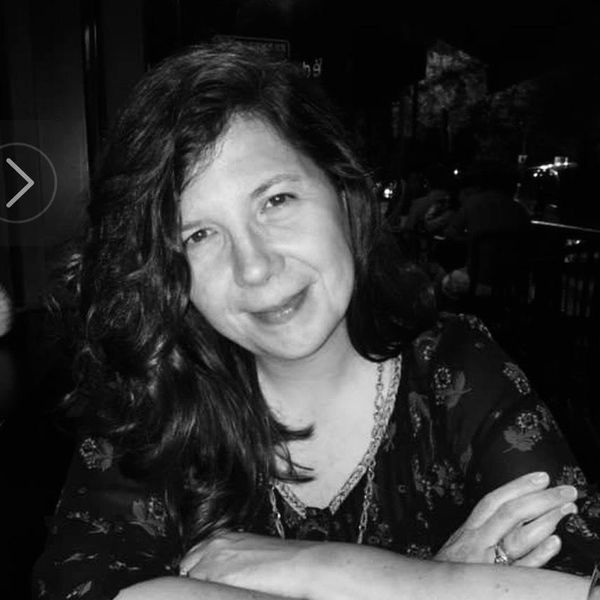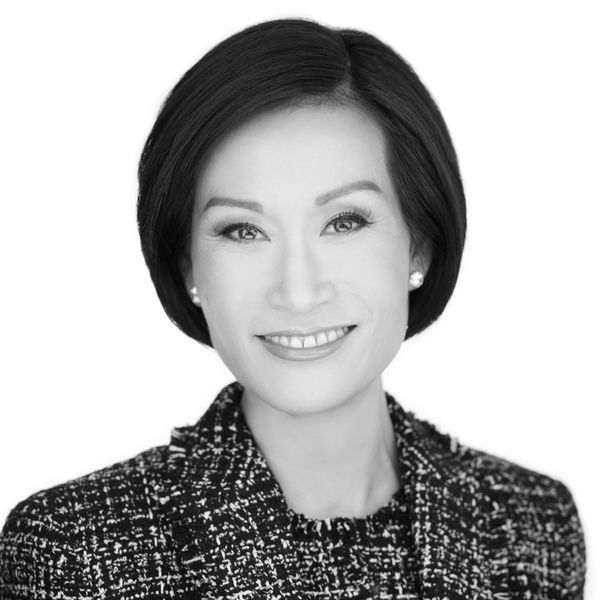Trending Now
We have updated our Privacy Policy and Terms of Use for Eurasia Group and its affiliates, including GZERO Media, to clarify the types of data we collect, how we collect it, how we use data and with whom we share data. By using our website you consent to our Terms and Conditions and Privacy Policy, including the transfer of your personal data to the United States from your country of residence, and our use of cookies described in our Cookie Policy.
{{ subpage.title }}
DVF in Davos: A fashion icon is still fighting for gender equality
“I wanted to be a woman in charge,” Diane von Furstenberg said. “And I became a conduit for a certain freedom.”
The iconic fashion designer, who changed women’s apparel 50 years ago with the “wrap dress,” has long been a champion of gender equality. This week in Davos, her work earned her a Crystal Award, presented annually by the World Economic Forum to creators and innovators making a positive impact on society.
DVF, in the rare stratosphere of stars known by just their initials, sat down with GZERO’s Tony Maciulis to talk about bridging the gender gap, the “masculine wave” currently in politics and business, what it means for diversity initiatives, and how she views her legacy decades into her historic career.
She reflected on the power of a “little dress” that built her career, her own inspirations including German actress and singer Marlene Dietrich, and why she has hope for the creative women of Gen Z.
Follow GZERO coverage of Davos here: https://www.gzeromedia.com/global-stage
Can we achieve gender equality by 2030?
It has been nearly 30 years since former US Secretary of State Hillary Clinton declared at the UN Conference on Women, hosted in Beijing, that “Women’s rights are human rights.” While progress has been made in some key areas, like education and access to healthcare, the number of women in the global labor force has remained largely stagnant since the 1990s. Women still trail men overall in income, digital inclusion, and even access to banking.
This week World Bank announced a bold initiative to bridge that divide by creating more economic opportunity, broadening female leadership, and reducing gender-based violence in the next 5 years as 2030 approaches. GZERO’s Tony Maciulis spoke to two of the architects of the plan—World Bank’s Global Head of Gender Hana Brixi, and Nathalie Akon Gabala, who is Global Director of Gender and Economic Inclusion at the International Finance Corporation.
Many global organizations have pledged to close the gender gap and have fallen short. Brixi tells Maciulis “more transparency and more accountability” will be needed to succeed, and details the approach World Bank will take in the coming years.
Watch more from Global Stage.
- Biden targets gender inequality in medical research ›
- What impact will AI have on gender equality? ›
- Graphic Truth: Are Canada and the US narrowing the gender pay gap? ›
- Bloc by Bloc: The gaping gender divide in the 2024 election ›
- DVF in Davos: A fashion icon is still fighting for gender equality - GZERO Media ›
- Leaders at Davos are turning "anxiety into action" - GZERO Media ›
Can the IMF change to help more women?
When a country hits rock bottom financially, the International Monetary Fund is meant to step in with funds to stabilize the economy without damaging its society — or the gender gap. But studies show that these programs often push women out of work at a disproportionate rate to men as the economy contracts.
Alongside this week’s World Bank-IMF Annual Meetings in Washington, DC, the IMF held a policy forum on Tuesday to discuss a new tool called Gender Impact Assessments, which are designed to help build more equitable programs — and protect some of the world’s most vulnerable women.
How do IMF programs hurt women’s opportunities? In any intervention, the IMF has to consider political practicalities in its policy recommendations. All too often, said Farah Al Shami, program director for social protection at the Arab Reform Initiative, “Austerity is politically easier than implementing tax reform.” Citing examples of governments in the Middle East and North Africa, which already spend proportionally less than peer countries on social services and safety nets and have higher female unemployment, she explained that austerity measures push more women than men out of the workforce as the economy contracts, while also reducing the benefits they need. Even more politically palatable ways to raise revenue, like value-added taxation, can disproportionately burden poor women due to their regressive nature.
Why are women forgotten? Tara Povey, the gender equality and macroeconomics project lead at the Bretton Woods Project, said the approach to gender has been too “scattershot” and often falls down the priority list in negotiations. The IMF’s Gender and Inclusion Deputy Unit Chief Monique Newiak, meanwhile, said that even when gender considerations are taken into account, too much of the focus is placed on metrics like labor force participation and not enough on social aspects like child marriage and gender-based violence.
How could Gender Impact Assessments help? By reorganizing the program development process to include key questions about women — including whether policies could force more unpaid family labor on women, monopolize women’s time, or lead to more hiring discrimination — the IMF can begin tailoring more inclusive programs. Rather than suffering social setbacks, the Fund could ensure that women are at the very least not harmed, and ideally set up for greater success in a recovered economy.
The future women want
GZERO’s Tony Maciulis spoke with Annemarie Hou, Executive Director of the UN Office for Partnerships, which conducted the campaign, to learn more about the survey, and why there are reasons for hope in the face of so many challenges. An overwhelming 85% of women identify themselves as advocates for women’s rights and believe women’s representation will improve in the next decade. Despite issues like climate, conflict, peace and justice still being top concerns, women are still optimistic.
A man and woman walk in front of the World Economic Forum Convention Center in Davos, Switzerland.
Hard Numbers: Women attendees in Davos, Talks on peace in Ukraine, Taxing extreme wealth, Rebuilding homes in Gaza
80: The ongoing war in Ukraine, which is nearly two years old, was a big topic in Davos this year. National security advisors from over 80 countries gathered in the Alpine ski town before the summit officially kicked off to discuss Kyiv's 10-point peace plan. Moscow has clearly been paying attention and dismissed meetings on Ukraine's peace formula as "pointless."
250: Over 250 millionaires and billionaires, including Disney heir Abigail Disney, lent their signatures to an open letter addressed to political leaders gathered in Davos, calling on them to do more to tax extreme wealth. "Our request is simple: We ask you to tax us, the very richest in society," the letter said.
15,000,000,000: The cost of rebuilding houses in Gaza will be at least $15 billion, the head of the Palestine Investment Fund said in Davos, as the Israel-Hamas war wreaks havoc on infrastructure across the coastal enclave. Chairman Mohammed Mustafa said it's estimated that around 350,000 housing units in Gaza have been completely or partially destroyed so far.Meta CEO Mark Zuckerberg.
Hard Numbers: Meta’s mess, Bangladesh’s bailout, Africa’s floods, China’s gender gap
11,000: There’s nothing meta about it: Mark Zuckerberg’s company on Wednesday laid off more than 11,000 employees, totalling 13% of its workforce. The cuts come after a wretched year for Meta, which is struggling with lower digital ad revenue amid a global economic slowdown, while facing fierce competition from other platforms for younger users. Zuck says the company will now focus more narrowly on artificial intelligence, advertising, and his beloved metaverse.
4.5 billion: Bangladesh is the latest country to have secured a provisional bailout – worth a whopping $4.5 billion – from the International Monetary Fund. Already highly indebted before the dual crises of COVID and the war in Ukraine, Bangladesh has seen its foreign reserves completely dry up.
4 million: Farmers across Central and West Africa are reeling after torrential floods decimated their crops. At least 4 million people, mostly small subsistence farmers, say their harvests have been destroyed. This comes as many import-reliant African countries were already facing severe food insecurity due to the war in Ukraine.
33: Under President Xi Jinping’s tenure, female participation in the Chinese workforce has dropped significantly, with the country's place in the World Economic Forum’s Global Gender Gap Report having fallen 33 places since 2012. Cultural norms in China have certainly shifted since Beijing hosted the UN’s Fourth World Conference on Women in 1995, where Hillary Clinton famously proclaimed that “women’s rights are human rights.”Episode 8: How closing the gender gap drives economic growth
Listen: “Women make about 75% of all household consumption decisions, and control close to 100 trillion in wealth,” says Ida Liu, Global Head of Citi Private Bank. "Women can no longer be ignored."
On the latest episode of Living Beyond Borders, we look at the impact women have in 2022 on the U.S. and global economy.
After some progress in the number of women in leadership positions and running businesses, the COVID-19 pandemic saw a setback for millions of women, especially those responsible for childcare. We'll look at how they are faring, and the gains women around the globe stand to obtain in the coming years.
This episode is moderated by Tracy Moran, managing editor of GZERO's daily newsletter Signal; and features Ida Liu, Global Head of Citi Private Bank, and Isadora Seixas, Global Macro-Geostrategy Analyst at Eurasia Group.

Tracy Moran
Managing Editor, Signal, GZERO Media

Ida Liu
Global Head, Citi Private Bank

Isadora Seixas
Global Macro-Geostrategy Analyst, Eurasia Group
- S3 Episode 6: Economic weapons & fallout of the new Cold War ... ›
- S3 Episode 1: If the economy is good, why do I feel so bad ... ›
- S3 Episode 3: Will there be a recession? - GZERO Media ›
- S3 Episode 5: Could today's crisis lead to future growth? - GZERO ... ›
- The economic power of women - GZERO Media ›
- Episode 3: Inflation Nations: What to know about inflation and interest rates - GZERO Media ›


